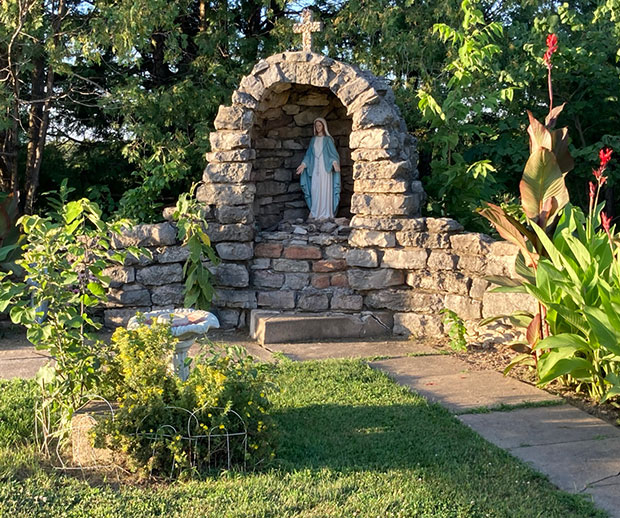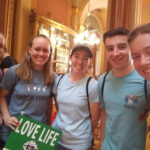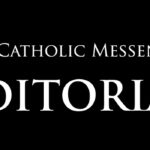
A grotto devoted to the Virgin Mary was built in 1982 at the entrance of the burned-down church at Polishville.
(Editor’s note: portions of this article appeared in the Southeast Iowa Union, 3-30-23, https://tinyurl.com/43kk6wpa)
By Konrad Sadkowski
For The Catholic Messenger
On Oct. 21, 1883 a new Catholic church in “Polishville,” about five miles south of Brighton in southeastern Iowa, was consecrated as St. Mary of the Immaculate Conception Church. This year marks the 140th anniversary of St. Mary’s consecration. The formal anniversary celebration will take place next year because the Polishville Association’s nonprofit status has lapsed.
This year, the Polishville Association invites everyone to the Polishville Fall Gathering on Oct. 21, from 11:30 a.m. to 3 p.m. to celebrate a day of remembrance with food, polka music, bingo, cards and fellowship. Festivities take place at the Polishville Community Center, 1345 Tamarack Ave., Brighton (at the intersection of Tamarack Avenue and 136th Street).
Here is the schedule (all events/activities are free):
11: 30 a.m., recitation of the rosary by the grotto (bring a lawn chair).
Noon, prayer and welcome inside the community center.
Noon-1:30 p.m., lunch (free will offering).
Noon-3 p.m., polka music, cards, museum is open, self-guided cemetery walk.
2-3 p.m., bingo.
To volunteer with the gathering, please contact Susan Hervey, association secretary at smosinski86@gmail.com or call (641) 680-1441.
St. Mary was a distinctly Polish-language church. Beginning around 1855 with three families, the number of Poles in Walnut Township of Jefferson County grew. By 1878, these immigrants received permission from the bishop of Dubuque to establish their own Polish-language church, distinct from the nearby German-language Catholic mission church, Ss. Peter and Paul in Germanville.
With the construction of St. Mary’s, Polishville as an ethnic Polish rural settlement thrived, the only one of its kind in Iowa, the Polish church now being its center. The Mass was then celebrated in Latin, so some non-Poles, such as Czechs and Germans, also attended St. Mary’s and became part of the broader Polishville community, in particular after Ss. Peter and Paul closed and was dismantled around 1905-1910.
By the early 20th century, the replenishment of assimilating Poles by immigrant Poles slowed and ended. Polishville, with fewer and fewer speakers of the Polish language, moved in the direction of a Polish heritage rural settlement. The period of resident Polish pastors ended in 1930 and St. Mary’s church closed in 1945. An all-consuming fire destroyed the unused church on July 15, 1971. St. Joseph Parish in nearby East Pleasant Plain overtook Polishville as the local Catholic center.
St. Mary’s and Polishville could have passed into history, but the cemetery remained. A number of descendants of the early Polish (and some non-Polish) settlers were determined to maintain it and keep the memory of Polishville’s ancestors alive. The Polishville Cemetery Association was founded in 1978 and a grotto devoted to the Virgin Mary was built in 1982 at the entrance of the burned-down church to commemorate the 100th anniversary of the church’s construction.
The Polishville Community Center, built in 1988, expanded to include the Esther Johanna Peck Museum in 1995. Individuals with no Polish or Catholic heritage were among the many contributors and volunteers over the years. Donations, annual bazaars, bingo luncheons, raffles and many polka dances at the community center funded this new era of Polishville.
A gradual decline set in as the new millennium arrived. In April 2019, Bill Peck, a main leader, wrote in his newsletter, “Our regular crowd [at the polka dances] continues to drop due to age, sickness, and death!” Less than a year later, the COVID-19 pandemic forced Polishville to take a deep “pause” and to consider a lingering question: will Polishville’s polka dances and, possibly, annual bazaars, resume?
Several members of a younger generation have stepped forward with the goal of reviving Polishville and directing it toward a new era of activities and public outreach. These new leaders want to preserve the memory of their ancestors and the unique heritage of St. Mary’s and Polishville. They are determining the type of events to host in the future.
Please join the gathering at Polishville on Oct. 21 to help put Polishville on the path toward a strong revival! If you have questions, please contact any of the other new Polishville board members:
Bob Mosinski, president (wldservices1@outlook.com), (641) 919-0104; Dave Shemanski, vice president (Davesheman66@gmail.com), (319) 325-5170; and Dennis Drish, treasurer (drishdenny@gmail.com)
(Konrad Sadkowski is a professor in the history department at the University of Northern Iowa.)











